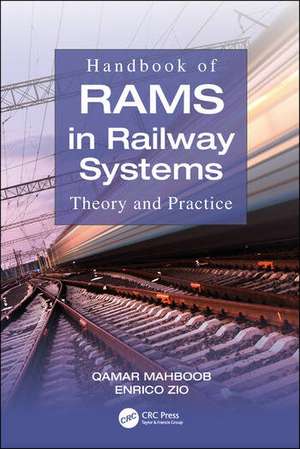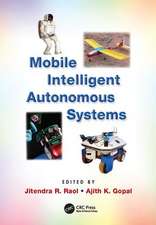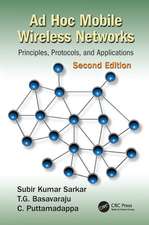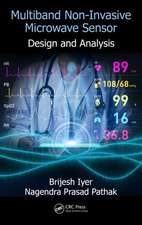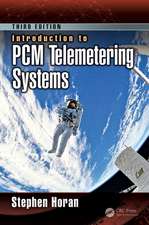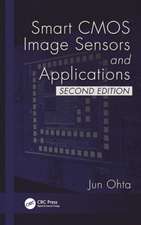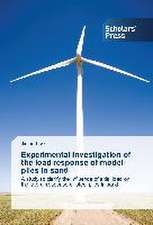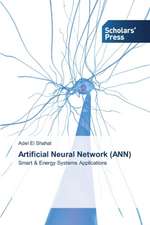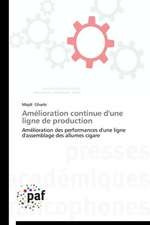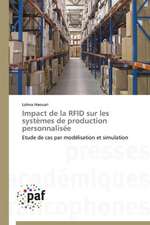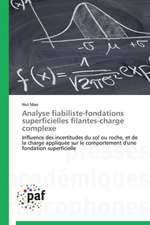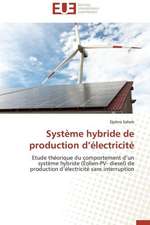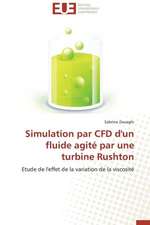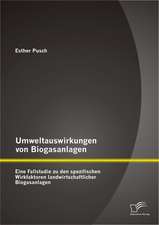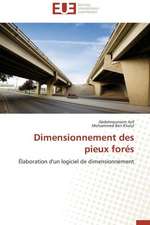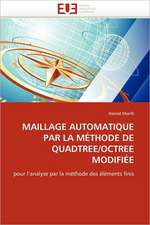Handbook of RAMS in Railway Systems: Theory and Practice
Editat de Qamar Mahboob, Enrico Zioen Limba Engleză Hardback – 29 mar 2018
Preț: 1581.91 lei
Preț vechi: 1929.15 lei
-18% Nou
Puncte Express: 2373
Preț estimativ în valută:
302.69€ • 316.89$ • 250.46£
302.69€ • 316.89$ • 250.46£
Carte tipărită la comandă
Livrare economică 07-21 aprilie
Preluare comenzi: 021 569.72.76
Specificații
ISBN-13: 9781138035126
ISBN-10: 1138035122
Pagini: 765
Ilustrații: 150 Illustrations, black and white
Dimensiuni: 178 x 254 x 48 mm
Greutate: 1.52 kg
Ediția:1
Editura: CRC Press
Colecția CRC Press
ISBN-10: 1138035122
Pagini: 765
Ilustrații: 150 Illustrations, black and white
Dimensiuni: 178 x 254 x 48 mm
Greutate: 1.52 kg
Ediția:1
Editura: CRC Press
Colecția CRC Press
Cuprins
Basic Concepts, and Prediction and Estimation Techniques for RAMS. Introduction to the Requirements for Railway RAMS Management. Practical Statistics of RAMS Parameters. Basic Methods for RAM Analysis and Decision Making. Advance Methods for RAM Analysis and Decision Making. Framework for Risk and Decision Assessment in Engineering Systems. Methodologies for RAM and Safety Apportionment in Complex Railway Projects. Prognostics Management in Railways. Health Monitoring of Railway Assets within the Concept of RAMS. Human Factors in Railways and their Assessment. Introduction to IT Transformation of Safety and Risk Management Systems. Methods for Determining Safety Integrity Levels (SIL) in Railways. Maintainability Analysis Methods in Railways. CIFFA (Component, Interfaces and Functional Failure Analysis) for Combined and Improved Railway RAMS Assessment. Reliability Demonstration Tests: Decision Rules and Associated Risks. RAMS in Practice. Application of Risk Analysis Methods for Railway Level Crossing Problems. Methodology and Application of RAMS Management along the Railway Rolling Stock Lifecycle. Demonstration of Reliability and Availability in Guided Transportation Projects. Modeling Reliability Analysis of European Train Control System (ETCS). Systems Assurance for the Railway Electromechanical Products. Formal Reliability Analysis of Railway Systems using Theorem Proving. RAMS Considerations for MEP and ICT Systems for Railways. Estimation of Spare Parts based on RAMS Outputs. Decision Support for Maintenance Engineering: an Integrating Approach towards RAMS. Decision Support Systems for Railway RAMS: An Application from Railway Signaling. Maintainability Analysis in Railways: Practical Applications. Special Topics for RAMS. RAMS and Security. Optimal SIL Determination in Railways using a Utility-Based Approach. CENELEC Standards for Railway Signalling. The Role of Independent Assessor in RAMS Assessment. Managing SIL Certifications: A Guide for Product Suppliers and Product Owners. Application of the Code of Practices for RAMS Assessment: Real World Experience from the field of Rail Electrification. Importance of Safety Culture for RAMS. Railway Security: Policy, Law, and Regulation. Target Reliability Studies for New and Existing Railway Engineering Structures.
Notă biografică
Dr. Engr. Qamar Mahboob has more than 15 years of project experience and several scientific publications in the field of Reliability, Availability, Maintainability and Safety.
Qualification: degrees (PhD in Railway Risk, Safety and Decision Support from TU Dresden, Germany), (MSc. Transportation Systems form TU Munich, Germany), (MS Total Quality Management from Punjab University Lahore), (BSc. Mechanical Engg. from UET Lahore), (B-Tech from GCT Lahore) Experience: (Pakistan Railways, Maintenance Engineer for rolling stock), (Engineering Risk Analysis Group of TU Munich, Scientific researcher), (Chair of Railway Signalling and Transport Safety Technology of TU Dresden, Scientific researcher), (CERSS.com, RAMS Consultant), (Siemens AG, Germany, Key Senior Expert for RAMS) (HI-TEK Manufacturing Pvt. Ltd. Lahore, Technical Lead), (KKPower International Pvt. Ltd. Lahore, Services Manager), (SEATS Lahore, Director and CTO).
E-mail: qamarmahboob.pk@gmail.com
Prof. Dr. Enrico Zio (M'06–SM' 09) received the MSc degree in nuclear engineering from Politecnico di Milano in 1991 and in mechanical engineering from UCLA in 1995, and the Ph.D. degree in nuclear engineering from Politecnico di Milano and MIT in 1996 and 1998, respectively. He is currently Director of the Chair on Systems Science and the Energetic Challenge of the Foundation Electricite' de France (EDF) at CentraleSupélec, Paris, France, full professor and President of the Alumni Association at Politecnico di Milano, adjunct professor at University of Stavanger, Norway, City University of Hong Kong, Beihang University and Wuhan University, China and Co-Director of the Center for REliability and Safety of Critical Infrastructures (CRESCI), China, visiting professor at MIT university, Massachusetts, USA, Distinguished Guest Professor, Tsinghua University, Beijing, China. His research focuses on the modeling of the failure-repair-maintenance behavior of components and complex systems, for the analysis of their reliability, maintainability, prognostics, safety, vulnerability, resilience and security characteristics, and on the development and use of Monte Carlo simulation methods, soft computing techniques and optimization heuristics. He is author or co-author of seven international books and more than 300 papers on international journals.
Qualification: degrees (PhD in Railway Risk, Safety and Decision Support from TU Dresden, Germany), (MSc. Transportation Systems form TU Munich, Germany), (MS Total Quality Management from Punjab University Lahore), (BSc. Mechanical Engg. from UET Lahore), (B-Tech from GCT Lahore) Experience: (Pakistan Railways, Maintenance Engineer for rolling stock), (Engineering Risk Analysis Group of TU Munich, Scientific researcher), (Chair of Railway Signalling and Transport Safety Technology of TU Dresden, Scientific researcher), (CERSS.com, RAMS Consultant), (Siemens AG, Germany, Key Senior Expert for RAMS) (HI-TEK Manufacturing Pvt. Ltd. Lahore, Technical Lead), (KKPower International Pvt. Ltd. Lahore, Services Manager), (SEATS Lahore, Director and CTO).
E-mail: qamarmahboob.pk@gmail.com
Prof. Dr. Enrico Zio (M'06–SM' 09) received the MSc degree in nuclear engineering from Politecnico di Milano in 1991 and in mechanical engineering from UCLA in 1995, and the Ph.D. degree in nuclear engineering from Politecnico di Milano and MIT in 1996 and 1998, respectively. He is currently Director of the Chair on Systems Science and the Energetic Challenge of the Foundation Electricite' de France (EDF) at CentraleSupélec, Paris, France, full professor and President of the Alumni Association at Politecnico di Milano, adjunct professor at University of Stavanger, Norway, City University of Hong Kong, Beihang University and Wuhan University, China and Co-Director of the Center for REliability and Safety of Critical Infrastructures (CRESCI), China, visiting professor at MIT university, Massachusetts, USA, Distinguished Guest Professor, Tsinghua University, Beijing, China. His research focuses on the modeling of the failure-repair-maintenance behavior of components and complex systems, for the analysis of their reliability, maintainability, prognostics, safety, vulnerability, resilience and security characteristics, and on the development and use of Monte Carlo simulation methods, soft computing techniques and optimization heuristics. He is author or co-author of seven international books and more than 300 papers on international journals.
Descriere
The Handbook of RAMS in Railway Systems: Theory and Practice addresses the complexity in today's railway systems, which use computers and electromechanical components to increase efficiency while ensuring a high level of safety.
